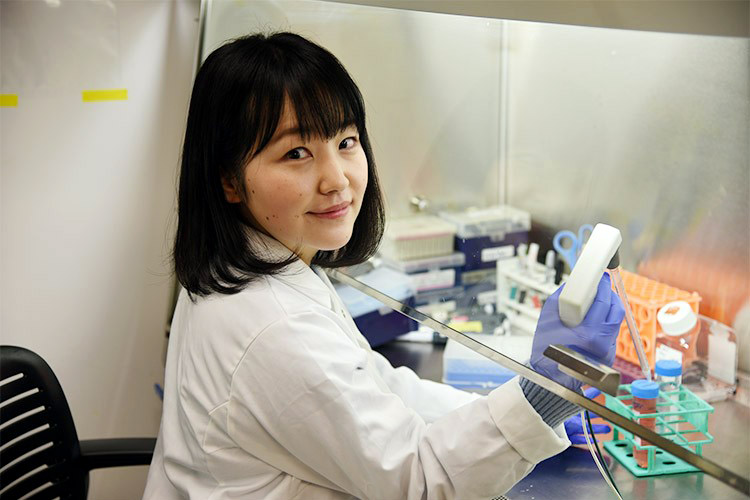
(UCSF) (Provided by Kei Hashimoto)
2021 White Paper on Science, Technology and Innovation emphasizes the importance of strengthening basic research and fostering human resources for the future. So, what kind of initiatives can effectively support you when trying to carve out your research path? We asked Kei Hashimoto, Project Assistant Professor of Ochanomizu University Academic Production, who is about to finish her three-year postdoctoral fellowship abroad, about her studies to date online.
"Program for Leading Graduate Schools" was a turning point
The number of patients with dementia, a neurological disease, is projected to increase with the accelerating aging of the Japanese population. Hashimoto is now at the forefront of research to develop a treatment for this disease. The results of her first two years of study at UCSF, where she worked on clarifying the mechanism of onset of the disease, were published in the scientific journal Nature in 2020. She then found compounds that can be candidates for therapeutic drugs. In March of this year, she was offered a Project Assistant Professor position at her alma mater and is about to finish up her postdoctoral life.
It was not until she had exposure to the research field in her master's program that she became intensely interested in working in research. Before that, she had hoped to become a biology teacher at a junior high school or high school, a job that would allow her to be involved in the biology field that she loves, just like the like-minded biology teacher she met in high school. "When I was an undergraduate and early master's student, I was doing my research passively, working only on the task at hand," she recalls.
The "Program for Leading Graduate Schools" was a significant turning point in changing that. With support from MEXT, the Ministry of Education, Culture, Sports, Science and Technology, Ochanomizu University started to nurture female leaders in science and engineering under the program "Fostering long-term creativity and innovation with science and technology disciplines based on the Ochanomizu spirit 'Migakazuba.' *1" First, "we had to find an independent research theme instead of being given an assignment as part of the program," says Hashimoto.
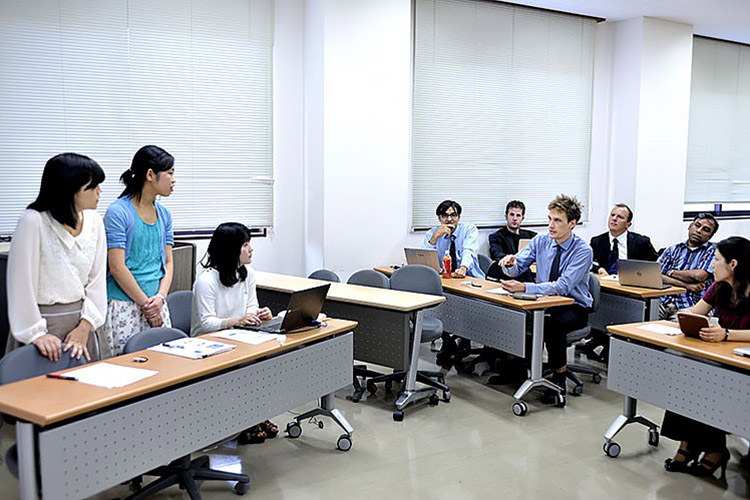
(Provided by Kei Hashimoto)
I had been interested in nerves and their associated diseases since I was a master's student, and while reading a paper in related fields, I came across a research result that said, "nerve cells do not age." I was surprised to learn "mice have a shorter lifespan than rats, but when mouse neurons are transplanted into rats, the transplanted cells continue to live beyond the lifespan of the mice."
If this is the case, why does dementia occur when nerve cells are lost? What the paper focused on were "glial cells," which led to Hashimoto's current research. They act as immune cells in the brain, regulating the environment around nerve cells. While nerve cells function only with the help of glial cells, activated glial cells show an aspect of attacking nerve cells. Due to this, glial cells got added to her list of research topics that she chose based on her interests.
Keenly felt a "foreign way" in harsh evaluations
"As the program was cross-disciplinary, it was very stimulating to interact with students from different fields." In the class where I teamed up with two other students, one majoring in mathematics and the other in physics, I was at a loss at first, like "I can't make myself understood." However, when I showed them a picture of a cell, they said to me, "I can show the cell's behavior with mathematical equations," and "I can analyze it with physics." We then exchanged ideas and proceeded to create a mathematical model of the cell. In this way, we steadily developed our own independent attitudes.
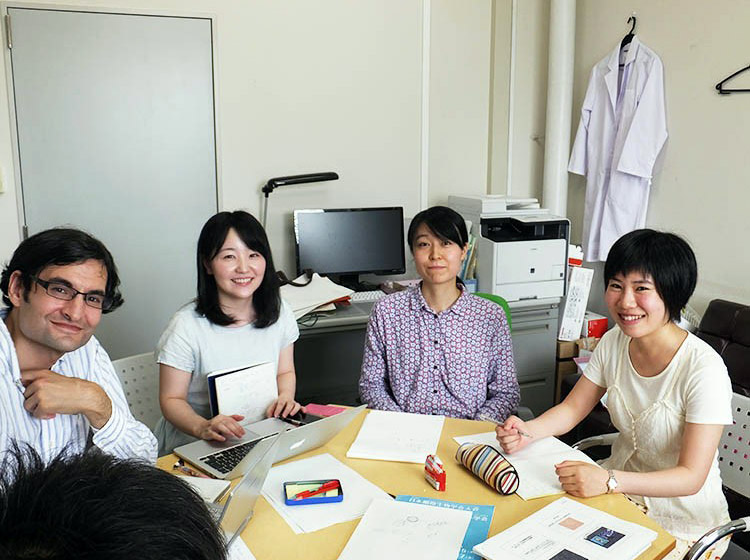
(Provided by Kei Hashimoto)
On the other hand, the teacher who taught mathematics in English was a French national, and was relentless enough to grade her "C," which she had rarely received before. She had been thinking, "It's outside my field, so I can get credit for it if I work hard to some extent," but she got a harsh evaluation. She got a glimpse of how hard overseas students work. From then on, her consciousness, which had been completed focused within the laboratory until then, turned outwards.
The "Program for Leading Graduate Schools" provides not only an environment that cultivates autonomy as a researcher but also financial support so that students can concentrate on their research without worrying about living expenses. Some of her colleagues chose to enter the doctoral program because of this program. The financial support also helped Hashimoto to continue her research as a postdoctoral fellow.
"Allowance" lowers the hurdle
"Go abroad." As she neared the end of her doctoral course, professors with overseas experience began to recommend that she study abroad. Hashimoto had not planned it because she was not very good at English and thought that research was a global activity no matter where she was. However, with a push from those professors, she decided to research at UCSF, which her advisor introduced.
The research grant provided to Hashimoto, a research fellow of the Japan Society for the Promotion of Science (JSPS) at that time, could be utilized at a destination of overseas study. She was also able to receive Ochanomizu University's overseas study grants. Being able to bring a "allowance" also helped lower the hurdle to studying abroad. Laboratories in the U.S. hire postdocs at minimum wage, but it will be easier for those labs to accept outside postdocs who can secure equivalent money themselves.
It took her about six months to get used to life in the U.S., but with many students from Asia in the laboratory, she could proceed with her research smoothly. She said, "There were researchers from many different countries, and I was able to experience research that I could not in Japan." It was supposed to be a one-year challenge, but she ended up spending a total of three years in California as a JSPS Research Fellow, although she was desperate for Ramen.
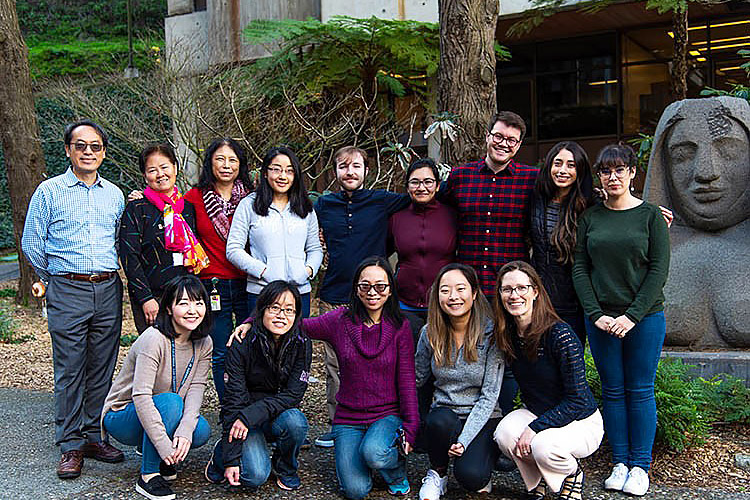
(Provided by Kei Hashimoto)
Combining the best of American and Japanese ways
During her postdoctoral life, she has been working on clarifying the pathogenic mechanism of frontotemporal dementia, one of the four major types of dementia. Patients of this type behave impulsively and become socially isolated. It is thought that the glial cells do not work correctly, which disrupts the surrounding environment and damages the neurons.
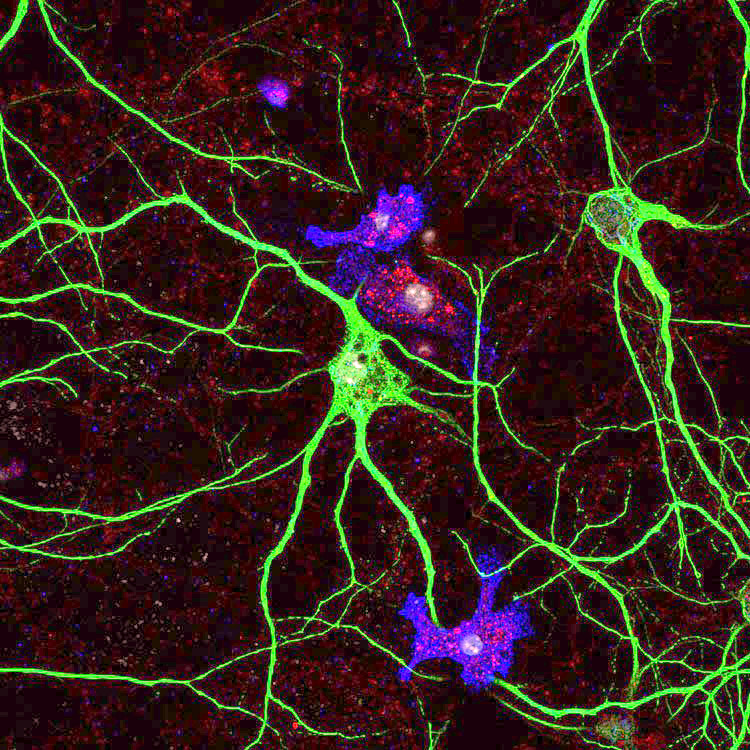
(Provided by Kei Hashimoto)
The candidate compound for the therapeutic drug is about to move onto the next stage, where a U.S. venture company will investigate its effectiveness. Hashimoto herself has decided to return to Japan to improve her career as a researcher. She plans to conduct a "lateral expansion," in which she will find out therapeutic effects of a different compound for frontotemporal dementia using the model cells she used for her research in the U.S. The drug for multiple sclerosis, which is known to be caused by a similar mechanism, may be effective.
She feels that in Japan, research is conducted in the direction of deeper understanding, for example, the in-depth pursuit of the function of a single protein. In contrast, U.S. research tends to expand horizontally, like to see if a single event occurs in other areas. By combining the best of the U.S. and the Japanese styles, Hashimoto is trying to develop her own unique way of conducting research.
Hashimoto hopes to share her experience as a postdoctoral researcher abroad with those who will aim to do the same in the future. When she started considering her study abroad, she often had to go through the process by herself because there were no senior graduate school students to consult with. But once in the U.S., she got a place to exchange information with other students from Japan and started to get some outlooks. She wishes to use her experience as a concrete example of utilizing support tailored to a researcher's stage.
Balancing life events and research is the key
In Japan, female researchers tend to be more affected by life events such as marriage, childbirth, and child-rearing than male researchers. Based on what she saw in the U.S., Hashimoto would like to consider what support is necessary for those female researchers who want to continue their research. Having realized that daily accumulation is essential for research, she thinks that a way to reduce "interruptions" might be the key.
She was surprised at the number of women in the doctoral program ― perhaps it's because UCSF has a nursing department. The U.S. may indeed be different from Japan. Men also take paternity leave, the practice of hiring babysitters is widespread, and there is an extensive financial support system for young researchers regardless of gender. Even so, she shows her eagerness to develop some ideas to improve the environment around her.
"Action is also important in research." Hashimoto, who is moving up one stage in her researcher career, looks back, saying that in addition to autonomy, taking action is also essential for a researcher. You have to think about how to proceed with your research on your own. It is you who builds up a hypothesis and proves it. Time passes if you hesitate, but if the goal you set is too high, you will have cold feet.
Hashimoto says that she was setting three levels of goals as her guideline: "High goals, goals that are reachable if you work a little harder, and goals that are achievable if you take action." It may be practical advice only she can give based on what she has noticed, for she didn't plan to be a researcher at first. As one of the "leaders in science and engineering," there are many things that Hashimoto can pass on to the next generation of researchers.
Editor's note: The application period for the "Program for Leading Graduate Schools" ended in 2013, and "Doctoral Program for World-leading Innovative & Smart Education" (JSPS) is currently in place.
*1 Migakazuba: "Just as a jade or a mirror becomes brighter when it is polished, it is important to work hard at your studies every day without neglecting them."
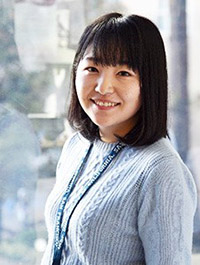
HASHIMOTO Kei
Project Assistant Professor at Ochanomizu University Academic Production
Graduated from the Department of Biology, Faculty of Science, Ochanomizu University in 2013 and completed the Graduate School of Humanities and Sciences, Ochanomizu University in 2018. Ph.D. (Science). Currently a visiting researcher
(postdoctoral fellow) at UCSF, U.S. She assumed her current position in March 2021.
(OTORI Chikako, Freelance Writer)
Original article was provided by the Science Portal and has been translated by Science Japan.




